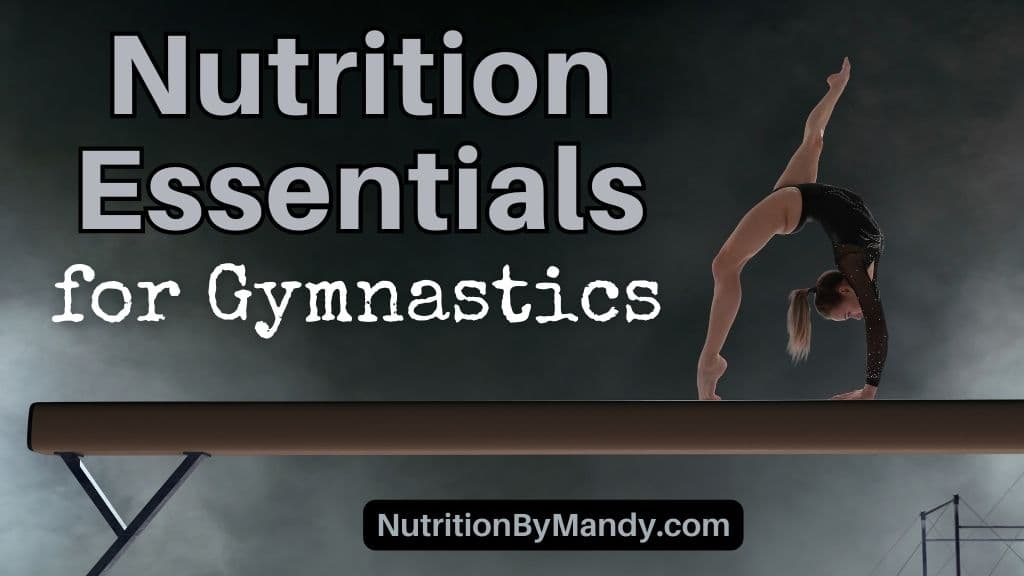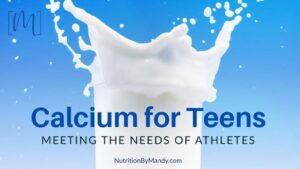Last Updated on February 23, 2025 by Mandy Tyler, M.Ed., RD, CSSD, LD
Nutrition Essentials for Gymnastics
This blog post was written by dietetic intern Natalie Larsen. Reviewed, edited, and updated by Mandy Tyler, M.Ed., RD, CSSD, LD, LAT.
Nutrition plays a vital role in optimizing the health and performance of gymnasts. Let’s explore key nutrition strategies for gymnastics to help ensure that gymnasts are fueled to train and perform at their best.
The Role of Nutrition in Gymnastics
Gymnastics is a demanding sport that requires strength, agility, flexibility, and precision.
A well-planned sports nutrition diet can provide the necessary nutrients to fuel optimal performance, support recovery from activity, and promote the overall health and well-being of gymnasts.

Carbohydrates for Gymnasts
Carbohydrates play a crucial role in providing gymnasts with the energy needed for training and competition. Gymnastics relies heavily on the body’s carbohydrate stores to support the high-intensity, explosive movements of the sport.
Gymnasts can add carbohydrates to their meals and snacks with foods from the following food groups:
- Fruit: Fresh, frozen, dried, canned (natural juices)
- Starchy vegetables: Potatoes, sweet potatoes, winter squash, corn, peas, beans, legumes
- Grains: Bread, cereal, oatmeal, rice, pasta, quinoa
- Dairy: Milk, yogurt
Consuming carbohydrates before, during, and after activity can provide athletes with the energy needed to train and perform at their best.
Protein for Gymnasts
Protein plays an important role in the diet of gymnasts. It provides gymnasts with the building blocks necessary for building and repairing lean muscle, which is essential when engaging in a sport that demands strength and power.
To get the most benefit from protein intake, gymnasts should spread their protein intake throughout the day with meals and snacks (1, 2). In general, aiming to consume 0.25-0.3 grams of protein/kg of body weight at each eating occasion (~20 – 30 grams).
By combining protein consumption with a well-planned training program, gymnasts can support muscle development, enhance strength and power, and promote injury prevention.

Healthy Fats for Gymnasts
While carbohydrates and protein are often emphasized for athletes, incorporating healthy fats into a gymnast’s diet is also important.
Dietary fat provides the body with a source of energy and is also necessary for hormone regulation and the absorption of fat-soluble vitamins. Essential fatty acids are necessary for optimal brain function.
It is important for gymnasts to incorporate sources of healthy, unsaturated fats into their meals and snacks. Gymnasts should aim to balance their fat intake with the other macronutrients (carbohydrates and protein) for optimal energy.
To support health, gymnasts should consume at least 30% of total energy from healthy sources of fat (3). Suggestions for healthy fats to include in a gymnast’s meal plan include:
- Avocados
- Nuts, nut butters
- Seeds, seed butters
- Fatty fish
- Olives, olive oil
When it comes to performance, gymnasts should limit the amount of dietary fat consumed with the pre-game meal. Fat is digested slowly by the body and may cause GI distress if eaten too close to the start of the activity (2).
Essential Vitamins and Minerals
Adequate intake of essential vitamins and minerals is crucial to support performance, recovery, and the overall health of the gymnast.
Key micronutrients gymnasts should focus on include:
- Calcium: Calcium is essential for strong and healthy bones, which are vital for gymnasts to withstand the impact and stress on their bodies during training.
- Vitamin D: Vitamin D is necessary for absorption and utilization of calcium. It also helps maintain bone health, supports muscle function, and contributes to overall health.
- Iron: Iron is essential for oxygen transportation in the body and is crucial for gymnasts who engage in intense exercise.
- Magnesium: Magnesium is involved in energy metabolism, muscle function, and nerve transmission, making it an important part of a gymnast’s diet.
Gymnasts should consult with a sports dietitian nutritionist before taking vitamin and mineral supplements.
Excess consumption of some micronutrients can interfere with the absorption of others. In addition, excess intake can lead to adverse side effects, such as nausea and vomiting.
Nutrition for Gymnastics: Pre-Workout Meals and Snacks
Before training or a meet, it is important for gymnasts to consume a balanced snack or meal that provides sustained energy and supports optimal performance.
When planning a pre-workout meal, gymnasts should include a good source of carbohydrates along with a moderate amount of lean protein.
It is best to eat the pre-competition meal approximately 3-4 hours prior to the start of the gymnastics meet. This allows time for the body to digest the food and for the gymnast to go to the bathroom if needed before the meet begins.
When planning the pre-competition meal, individual tolerance and food preferences should be considered along with meal timing.
It is best for gymnasts to practice with different foods and meal timing to determine what foods they feel best competing on.

Pre-Gymnastics Snacks
When gymnasts have less time before activity, they can consume smaller carbohydrate-rich snacks. The carbohydrates will provide gymnasts with a quick source of energy for their upcoming workout or competition.
Snacks gymnasts can enjoy prior to activity include:
- Banana or small piece of fresh fruit
- Applesauce squeeze pouch
- Dried fruit, fruit leather, fruit snacks
- Low-fat granola bars, fig bars
- Mini bagels, bread
- Animal or graham crackers
- Pretzels, pita chips, crackers, dry cereal
- Sports drink, chews, gels
Nutrition for Gymnastics: Importance of Hydration
Hydration is an essential part of a gymnast’s sports nutrition game plan. It is not only important for performance, but also necessary for regulating body temperature, cognitive function, and a gymnast’s overall health and well-being (4).
Tips for hydration include:
- Drink fluids throughout the day, not just during training sessions or competitions.
- Aim to consume water regularly, but also consider electrolyte rich beverages or sports drinks during intense or prolonged workouts.
- Monitor urine color. Pale yellow urine (color of lemonade) generally indicates good hydration, while darker urine (color of apple juice) may indicate dehydration.
- Hydrate before, during, and after training and meets to ensure fluid balance.
Nutrition for Gymnasts: Fuel Your Performance with Carbohydrates
Consuming carbohydrates during workouts and competitions that are of high-intensity and/or of a long duration can provide gymnasts with energy to support performance. Gymnasts should aim to consume ≥ 30 grams of carbohydrates per hour of activity (3).
The same carbohydrate-rich snacks enjoyed leading up to the workout are great options to enjoy during the activity as well. Gymnasts should make sure to pack snacks in their backpacks or gym bags to have available at practice and competitions.
Sports drinks containing a 6-8% carbohydrate solution can support gymnasts with meeting carbohydrate needs during activity. In addition, sports drinks can help gymnasts replace the fluid and electrolytes lost in sweat (5).
Nutrition for Gymnastics: Post-Workout Recovery
Ensuring proper nutrition after the workout is just as essential as what the gymnast consumes before and during the activity.
Well-planned post workout snacks and meals are essential to support proper recovery from exercise, to replenish energy stores, and to promote muscle repair.
The key concepts that athletes should keep in mind when planning a post-workout meal include:
- Hydrate: Replace fluid and electrolytes lost in sweat
- Refill Energy Stores: Consume carbohydrates to replace energy stores used during activity
- Build and Repair: Consume protein to help build and repair lean muscle mass
If it will be several hours following the workout until the next meal, gymnasts should consider eating a post-workout snack containing carbohydrates and protein. A post-workout fruit smoothie can be a convenient option following a gymnastics practice.
Individual nutrition needs may vary based on factors such as training intensity, body weight, and performance goals. Gymnasts should keep in mind that recovery nutrition is of particular when the amount of time between workouts or competitions is limited.

Disordered Eating Behaviors in Gymnasts
Gymnastics is a weight-sensitive sport, as it requires athletes to lift and flip their own body weight.
As weight pressures increase among young gymnasts, so does the concern for disordered eating behaviors. Research has found a higher prevalence of eating disorders in athletes participating in aesthetic related sports, such as gymnastics (6).
It is important to note that disordered eating exists on a spectrum, ranging from occasional unhealthy eating and exercise behaviors to clinically diagnosed eating disorders (7).
If a gymnast is demonstrating disordered eating behaviors or a unhealthy relationship with food, body image, or weight, it is important to seek help for the gymnast.
Underfueling in Gymnasts
Underfueling occurs when a gymnast’s daily caloric expenditure exceeds the dietary intake of calories from food and beverages.
This imbalance of calories results in inadequate energy being available to support the gymnast’s health and performance. We refer to this imbalance of calories and resulting low energy availability as Relative Energy Deficiency in Sport or REDs (8).
REDs is associated with a syndrome of health and performance concerns, including (8):
- Nutrient deficiencies
- Low bone density leading to increased risk of stress fractures
- Disruption of the menstrual cycle in females
- Increased risk of illness, infection, and injury
- Sleep disturbances
- Decreased response to training
- Gymnasts expressing feelings of burnout
It is important for gymnastics coaches and parents to be aware of underfueling and potential signs of disordered eating. Gymnasts should be educated on the importance of consuming adequate calories to fuel their bodies and support their overall health.
Nutrition for Gymnastics: Nourishing Your Body for Success
Proper nutrition is a key component of success for gymnasts. From fueling workouts to promoting recovery and supporting overall health, the right balance of nutrients plays a crucial role in the performance and well-being of gymnasts.
For additional sports nutrition resources and information, make sure to check out this blog with nutrition tips for the teen girl athlete.
Join the Nutrition By Mandy Email List & Get a Free Athlete’s Grocery List
Click HERE to join the Nutrition By Mandy e-mail list. When you join you will receive a free athlete’s grocery list to print and take with you to the store.
About Mandy
Mandy Tyler is a Sports Dietitian Nutritionist in the San Antonio, TX area. She is a Registered and Licensed Dietitian, a Board-Certified Specialist in Sports Dietetics, a Licensed Athletic Trainer, and is a Certified Exercise Physiologist through the American College of Sports Medicine. Mandy has experience working with athletes at the high school, collegiate, and professional levels. She believes the key to reaching one’s full potential, both in everyday life and in sports performance, relies on a healthy nutritional foundation.

If you are looking to take your performance to the next level, make sure to check out my new Sports Nutrition Game Day Guide. This downloadable guide is written to help athletes develop an individualized plan to achieve peak performance on game day.





